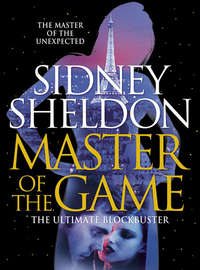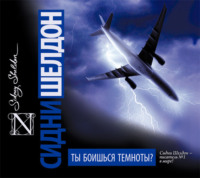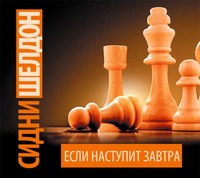
Полная версия
The Doomsday Conspiracy
“Thank you, Admiral.”
“Now, let’s get back to work.”
“I’m ready, sir.”
Robert had flown thirty-four bombing missions from the Ranger without incident.
His thirty-fifth mission was Package Six.
They had passed Hanoi and were heading northwest toward Phu Tho and Yen Bai. The flak was getting increasingly heavy. Edward Whittaker was seated on Robert’s right, staring at the radar screen, listening to the ominous bass tones of enemy search radars sweeping the sky.
The sky directly ahead of them looked like the Fourth of July, streaked with white smoke from the light guns below, dark gray bursts from the fifty-five-millimeter shells, black clouds from the hundred-millimeter shells, and colored tracer bullets from heavy machine-gun fire.
“We’re approaching target,” Edward said. His voice through the headphones sounded eerily far away.
“Roger.”
The A-6A Intruder was flying at 450 knots, and at that speed, even with the drag and weight of the bomb load, it handled remarkably well, moving too fast for enemies to track it.
Robert reached out and turned on the master armament switch. The dozen 500-pound bombs were now ready to be released. He was headed straight for the target.
A voice on his radio said, “Romeo—you have a bogey at four o’clock high.”
Robert turned to look. A MiG was hurtling toward him, coming out of the sun. Robert banked and sent the plane into a steep dive. The MiG was on his tail. It loosed a missile. Robert checked his instrument panel. The missile was closing in rapidly. A thousand feet away … six hundred … four hundred …
“Holy shit!” Edward yelled. “What are we waiting for?”
Robert waited until the last second, then released a stream of metal chaff and went into a steep climbing turn, leaving the missile to follow the chaff and crash harmlessly into the ground below.
“Thank you, God,” Edward said. “And you, pal.”
Robert continued the climb and swung behind the MiG. The pilot started to take evasive action, but it was too late. Robert loosed a Sidewinder missile and watched it crawl up the tail pipe of the MiG and explode. An instant later, the sky was showered with pieces of metal.
A voice came over the intercom. “Nice work, Romeo.”
The plane was over the target now. “Here we go,” Edward said. He pressed the red button that released the bombs and watched them tumble down toward their target. Mission accomplished. Robert headed the plane back toward the carrier.
At that instant, they felt a heavy thud. The swift and graceful bomber suddenly became sluggish.
“We’ve been hit!” Edward called.
Both fire-warning lights were flashing red. The plane was moving erratically, out of control.
A voice came over the radio. “Romeo, this is Tiger. Do you want us to cover you?”
Robert made a split-second decision. “No, go on to your targets. I’m going to try to make it back to base.”
The plane had slowed down and was becoming more difficult to handle.
“Faster,” Edward said nervously, “or we’re going to be late for lunch.”
Robert looked at the altimeter. The needle was dropping rapidly. He activated his radio mike. “Romeo to home base. We’ve taken a hit.”
“Home base to Romeo. How bad is it?”
“I’m not sure. I think I can bring it home.”
“Hold on.” A moment later the voice returned. “Your signal is ‘Charlie on arrival.’”
That meant they were cleared to land on the carrier immediately.
“Roger.”
“Good luck.”
The plane was starting to roll. Robert fought to correct it, trying to gain altitude. “Come on, baby, you can make it.” Robert’s face was tight. They were losing too much altitude. “What’s our ETA?”
Edward looked at his chart. “Seven minutes.”
“I’m going to get you that hot lunch.”
Robert was nursing the plane along with all the skill at his command, using the throttle and rudder to try to keep it on a straight course. The altitude was still dropping alarmingly. Finally, ahead of him, Robert saw the sparkling blue waters of the Tonkin Gulf.
“We’re home free, buddy,” Robert said. “Just a few more miles.”
“Terrific. I never doubted—”
And out of nowhere, two MiG’s descended on the plane with a thunderous roar. Bullets began thudding against the fuselage.
“Eddie! Bail out!” He turned to look. Edward was slumped against his seat belt, his right side torn open, blood spattering the cockpit.
“No!” It was a scream.
A second later, Robert felt a sudden, agonizing blow to his chest. His flight suit was instantly soaked in blood. The plane started to spiral downward. He felt himself losing consciousness. With his last ounce of strength, he unfastened his seat belt. He turned to take a final look at Edward. “I’m sorry,” he whispered. He blacked out and later had no recollection of how he ejected out of the plane and parachuted into the water below. A Mayday call had been sent out, and a Sikorsky SH-3A Sea King helicopter from the U.S.S. Yorktown was circling, waiting to pick him up. In the distance, the crew could see Chinese junks rapidly closing in for the kill, but they were too late.
When they loaded Robert into the helicopter, a medical corpsman took one look at his torn body and said, “Jesus Christ, he’ll never even make it to the hospital.”
They gave Robert a shot of morphine, wrapped pressure bandages tightly around his chest, and flew him to the 12th Evacuation Hospital at Cu Chi Base.
The “12th Evac,” which served Cu Chi, Tay Ninh, and Dau Tieng bases, had four hundred beds in a dozen wards, housed in quonset huts arranged around a U-shaped compound connected by covered walkways. The hospital had two intensive-care units, one for surgery cases, the other for burns, and each unit was seriously overcrowded. When Robert was brought in, he left a bright red trail of blood across the hospital floor.
A harried surgeon cut the bandages from Robert’s chest, took one look, and said wearily, “He’s not going to make it. Take him in back to cold storage.”
And the doctor moved on.
Robert, fading in and out of consciousness, heard the doctor’s voice from a far distance. So, this is it, he thought. What a lousy way to die.
“You don’t want to die, do you, sailor? Open your eyes. Come on.”
He opened his eyes and saw a blurred image of a white uniform and a woman’s face. She was saying something more, but he could not make out the words. The ward was too noisy, filled with a cacophony of screams and moans of patients, and doctors yelling out orders, and nurses frantically running around administering to the savaged bodies that lay there.
Robert’s memory of the next forty-eight hours was a haze of pain and delirium. It was only later that he learned that the nurse, Susan Ward, had persuaded a doctor to operate on him and had donated her own blood for a transfusion. Fighting to keep him alive, they had put three IV’s into Robert’s ravaged body and pumped blood through them simultaneously.
When the operation was over, the surgeon in charge sighed. “We’ve wasted our time. He’s got no more than a ten percent chance of pulling through.”
But the doctor did not know Robert Bellamy. And he did not know Susan Ward. It seemed to Robert that whenever he opened his eyes, Susan was there, holding his hand, stroking his forehead, ministering to him, willing him to live. He was delirious most of the time. Susan sat quietly next to him in the dark ward in the middle of the lonely nights and listened to his ravings.
“… The DOD is wrong, you can’t head in perpendicular to the target or you’ll hit the river … Tell them to angle the dives a few degrees off target heading … Tell them …” he mumbled.
Susan said soothingly, “I will.”
Robert’s body was soaked in perspiration. She sponged him off. “… You have to remove all five of the safety pins or the seat won’t eject … Check them …”
“All right. Go back to sleep now.”
“… The shackles on the multiple ejector racks malfunctioned … God only knows where the bombs landed …”
Half the time Susan could not understand what her patient was talking about.
Susan Ward was head of the emergency operating-room nurses. She had come from a small town in Idaho and had grown up with the boy next door, Frank Prescott, the son of the mayor. Everyone in town assumed they would be married one day.
Susan had a younger brother, Michael, whom she adored. On his eighteenth birthday, he joined the Army and was sent to Vietnam, and Susan wrote to him there every day. Three months after he had enlisted, Susan’s family received a telegram, and she knew what it contained before they opened it.
When Frank Prescott heard the news, he rushed over. “I’m really sorry, Susan. I liked Michael a lot.” And then he made the mistake of saying, “Let’s get married right away.”
And Susan had looked at him and made a decision. “No. I have to do something important with my life.”
“For God’s sake! What’s more important than marrying me?”
The answer was Vietnam.
Susan Ward went to nursing school.
She had been in Vietnam for eleven months, working tirelessly, when Commander Robert Bellamy was wheeled in and sentenced to die. Triage was a common practice in emergency evacuation hospitals. The doctors would examine two or three patients and make summary judgments as to which one they would try to save. For reasons that were never truly clear to her, Susan had taken one look at the torn body of Robert Bellamy and had known that she could not let him die. Was it her brother she was trying to save? Or was it something else? She was exhausted and overworked, but instead of taking her time off, she spent every spare moment tending to him.
Susan had looked up her patient’s record. An ace Navy pilot and instructor, he had earned the Naval Cross. His birthplace was Harvey, Illinois, a small industrial city south of Chicago. He had enlisted in the Navy after graduating from college and had trained at Pensacola. He was unmarried.
Each day, as Robert Bellamy was recuperating, walking the thin line between death and life, Susan whispered to him, “Come on, sailor. I’m waiting for you.”
One night, six days after he had been brought into the hospital, Robert was rambling on in his delirium, when suddenly he sat straight up in bed, looked at Susan, and said clearly, “It’s not a dream. You’re real.”
Susan felt her heart give a little jump. “Yes,” she said softly. “I’m real.”
“I thought I was dreaming. I thought I had gone to heaven and God assigned you to me.”
She looked into Robert’s eyes and said seriously, “I would have killed you if you had died.”
His eyes swept the crowded ward. “Where—where am I?”
“The 12th Evacuation Hospital at Cu Chi.”
“How long have I been here?”
“Six days.”
“Eddie—he—”
“I’m sorry.”
“I have to tell the admiral.”
She took Robert’s hand and said gently, “He knows. He’s been here to visit you.”
Robert’s eyes filled with tears. “I hate this goddamn war. I can’t tell you how much I hate it.”
From that moment on, Robert’s progress astonished the doctors. All his vital signs stabilized.
“We’ll be shipping him out of here soon,” they told Susan. And she felt a sharp pang.
Robert was not sure exactly when he fell in love with Susan Ward. Perhaps it was the moment when she was dressing his wounds, and nearby they heard the sounds of bombs dropping and she murmured, “They’re playing our song.”
Or perhaps it was when they told Robert he was well enough to be transferred to Walter Reed Hospital in Washington to finish his convalescence, and Susan said, “Do you think I’m going to stay here and let some other nurse have that great body? Oh, no. I’m going to pull every string I can to go with you.”
They were married two weeks later. It took Robert a year to heal completely, and Susan tended to his every need, night and day. He had never met anyone like her, nor had he dreamed that he could ever love anyone so much. He loved her compassion and sensitivity, her passion and vitality. He loved her beauty and her sense of humor.
On their first anniversary, he said to her, “You’re the most beautiful, the most wonderful, the most caring human being in the world. There is no one on this earth with your warmth and wit and intelligence.”
And Susan had held him tightly and whispered in a nasal, chorus-girl voice, “Likewise, I’m sure.”
They shared more than love. They genuinely liked and respected each other. All their friends envied them, and with good reason. Whenever they talked about a perfect marriage, it was always Robert and Susan they held up as an example. They were compatible in every way, complete soul mates. Susan was the most sensual woman Robert had ever known, and they were able to set each other on fire with a touch, a word. One evening, when they were scheduled to go to a formal dinner party, Robert was running late. He was in the shower when Susan came into the bathroom carefully made up and dressed in a lovely strapless evening gown.
“My God, you look sexy,” Robert said. “It’s too bad we don’t have more time.”
“Oh, don’t worry about that,” Susan murmured. And a moment later she had stripped off her clothes and joined Robert in the shower.
They never got to the party.
Susan sensed Robert’s needs almost before he knew them, and she saw to it that they were attended to. And Robert was equally attentive to her. Susan would find love notes on her dressing-room table, or in her shoes when she started to get dressed. Flowers and little gifts would be delivered to her on Groundhog Day and President Polk’s birthday and in celebration of the Lewis and Clark Expedition.
And the laughter that they shared. The wonderful laughter …
The pilot’s voice crackled over the intercom. “We’ll be landing in Zurich in ten minutes, Commander.”
Robert Bellamy’s thoughts snapped back to the present, to his assignment. In his fifteen years with Naval Intelligence, he had been involved in dozens of challenging cases, but this one promised to be the most bizarre of them all. He was on his way to Switzerland to find a busload of anonymous witnesses who had disappeared into thin air. Talk about looking for a needle in a haystack. I don’t even know where the haystack is. Where is Sherlock Holmes when I need him?
“Will you fasten your seat belt, please?”
The C20A was flying over dark forests, and a moment later, skimming over the runway etched by the landing lights of the Zurich International Airport. The plane taxied to the east side of the airport and headed for the small general aviation building, away from the main terminal. There were still puddles on the tarmac from the earlier rainstorms, but the night sky was clear.
“Crazy weather,” the pilot commented. “Sunny here Sunday, rainy all day today, and clearing tonight. You don’t need a watch here. What you really need is a barometer. Can I arrange a car for you, Commander?”
“No, thanks.” From this moment on, he was completely on his own. Robert waited until the plane taxied away, and then boarded a minibus to the airport hotel, where he collapsed into a dreamless sleep.
Chapter Seven
DAY TWO
0800 Hours
The next morning Robert approached a clerk behind the Europcar desk.
“Guten Tag.”
It was a reminder that he was in the German-speaking part of Switzerland. “Guten Tag. Do you have a car available?”
“Yes, sir, we do. How long will you be needing it?”
Good question. An hour? A month? Maybe a year or two? “I'm not sure.”
“Do you plan to return the car to this airport?”
“Possibly.”
The clerk looked at him strangely. “Very well. Will you fill out these papers, please?”
Robert paid for the car with the special black credit card General Hilliard had given him. The clerk examined it, perplexed, then said, “Excuse me.” He disappeared into an office, and when he returned, Robert asked, “Any problem?”
“No, sir. None at all.”
The car was a gray Opel Omega. Robert got onto the airport highway and headed for downtown Zurich. He enjoyed Switzerland. It was one of the most beautiful countries in the world. Years earlier he had skied there. In more recent times, he had carried out assignments there, liaising with Espionage Abteilung, the Swiss intelligence agency. During World War II, the agency had been organized into three bureaus: D, P, and I, covering Germany, France, and Italy, respectively. Now its main purpose was related to detecting undercover espionage operations conducted within the various UN organizations in Geneva. Robert had friends in Espionage Abteilung, but he remembered General Hilliard's words: “You're not to get in touch with any of them.”
The drive into the city took twenty-five minutes. Robert reached the Dübendorf downtown exit ramp and headed for the Dolder Grand Hotel. It was exactly as he remembered it: an overgrown Swiss chateau with turrets, stately and imposing, surrounded by greenery and overlooking Lake Zurich. He parked the car and walked into the lobby. On the left was the reception desk.
“Guten Tag.”
“Guten Tag. Haben Sie ein Zimmer für eine Nacht?”
“Ja. Wie möchten Sie bezahlen?”
“Mit Kreditkarte.” The black and white credit card that General Hilliard had given him. Robert asked for a map of Switzerland and was escorted to a comfortable room in the new wing of the hotel. It had a small balcony that overlooked the lake. Robert stood there, breathing in the crisp, autumn air, thinking about the task that lay ahead of him.
He had nothing to go on. Not one damned thing. All the factors to the equation of his assignment were completely unknown. The name of the tour company. The number of passengers. Their names and where-abouts. “Are the witnesses all in Switzerland?” “That's our problem. We have no idea where they are, or who they are.” And it wasn't enough to find some of the witnesses. “You must find every one of them.” The only information he had was the place and date: Uetendorf, Sunday, October 14.
He needed a handle, something to grab onto.
If he remembered correctly, all-day tour buses left from only two major cities: Zurich and Geneva. Robert opened a desk drawer and took out the bulky Telefonbuch. I should look under M, for miracle, Robert thought. There were more than half a dozen tour companies listed: Sunshine Tours, Swisstour, Tour Service, Touralpino, Tourisma Reisen … He would have to check each of them. He copied down the addresses of all the companies and drove to the offices of the nearest one listed.
There were two clerks behind the counter taking care of tourists. When one of them was free, Robert said, “Excuse me. My wife was on one of your tours last Sunday, and she left her purse on the bus. I think she got excited because she saw the weather balloon that crashed near Uetendorf.”
The clerk frowned. “Es tut mir viel leid. You must be mistaken. Our tours do not go near Uetendorf.”
“Oh. Sorry.” Strike one.
The next stop promised to be more fruitful.
“Do your tours go to Uetendorf?”
“Oh, ja.” The clerk smiled. “Our tours go everywhere in Switzerland. They are the most scenic. We have a tour to Zermatt—the Tell Special. There is also the Glacier Express and the Palm Express. The Great Circle Tour leaves in fifteen—”
“Did you have a tour Sunday that stopped to watch that weather balloon that crashed? I know my wife was late getting back to the hotel and—”
The clerk behind the counter said indignantly, “We take great pride in the fact that our tours are never late. We make no unscheduled stops.”
“Then one of your buses didn't stop to look at that weather balloon?”
“Absolutely not.”
“Thank you.” Strike two.
The third office Robert visited was located at Bahnhofplatz, and the sign outside said Sunshine Tours. Robert walked up to the counter. “Good afternoon. I wanted to ask you about one of your tour buses. I heard that a weather balloon crashed near Uetendorf and that your driver stopped for half an hour so the passengers could look at it.”
“No, no. He only stopped for fifteen minutes. We have very strict schedules.”
Home run!
“What was your interest in this, did you say?”
Robert pulled out one of the identification cards that had been given him. “I'm a reporter,” Robert said earnestly, “and I'm doing a story for Travel and Leisure magazine on how efficient the buses in Switzerland are, compared with other countries. I wonder if I might interview your driver?”
“That would make a very interesting article. Very interesting, indeed. We Swiss pride ourselves on our efficiency.”
“And that pride is well deserved,” Robert assured him.
“Would the name of our company be mentioned?”
“Prominently.”
The clerk smiled. “Well, then I see no harm.”
“Could I speak with him now?”
“This is his day off.” He wrote a name on a piece of paper.
Robert Bellamy read it upside down. Hans Beckerman.
The clerk added an address. “He lives in Kappel. That's a small village about forty kilometers from Zurich. You should be able to find him at home now.”
Robert Bellamy took the paper. “Thank you very much. By the way,” Robert said, “just so we have all the facts for the story, do you have a record of how many tickets you sold for that particular tour?”
“Of course. We keep records of all our tours. Just a moment.” He picked up a ledger underneath the counter and flipped a page. “Ah, here we are. Sunday. Hans Beckerman. There were seven passengers. He drove the Iveco that day, the small bus.”
Seven unknown passengers and the driver. Robert took a stab in the dark. “Would you happen to have the names of those passengers?”
“Sir, people come in off the street, buy their ticket, and take the tour. We don't ask for identification.”
Wonderful. “Thank you again.” Robert started toward the door.
The clerk called out, “I hope you will send us a copy of the article.”
“Absolutely,” Robert said.
The first piece of the puzzle lay in the tour bus, and Robert drove to Talstrasse, where the buses departed, as though it might reveal some hidden clue. The Iveco bus was brown and silver, small enough to traverse the steep Alpine roads, with seats for fourteen passengers. Who are the seven, and where have they disappeared to? Robert got back in his car. He consulted his map and marked it. He took Lavessneralle out of the city, into the Albis, the start of the Alps, toward the village of Kappel. He headed south, driving past the small hills that surround Zurich, and began the climb into the magnificent mountain chain of the Alps. He drove through Adliswil and Langnau and Hausen and nameless hamlets with chalets and colorful picture-postcard scenery until almost an hour later, he came to Kappel. The little village consisted of a restaurant, a church, a post office, and a twelve or so houses scattered around the hills. Robert parked the car and walked into the restaurant. A waitress was clearing a table near the door.
“Entschuldigen Sie bitte, Fraulein. Welche Richtung ist das Haus von Herr Beckerman?”
“Ja.” She pointed down the road. “An der Kirche rechts.”
“Danke.”
Robert turned right at the church and drove up to a modest two-story stone house with a ceramic tiled roof. He got out of the car and walked up to the door. He could see no bell, and knocked.
A heavyset woman with a faint mustache answered the door. “Ja?”
“I'm sorry to bother you. Is Mr. Beckerman in?”








